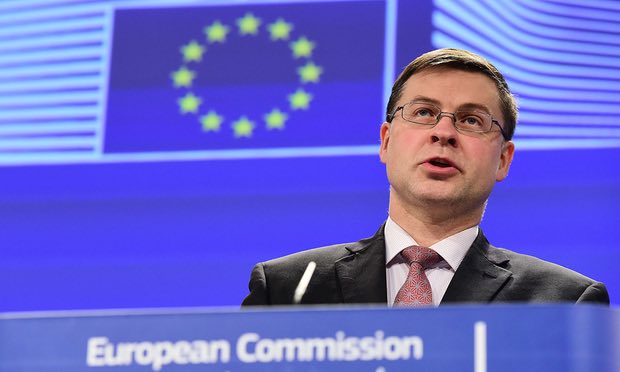
By Alissa de Carbonnel
BRUSSELS (Reuters) – EU regulators will unveil reforms on Wednesday to promote a greater share of renewables in Europe’s grid by 2030, with plans to cut energy use by 30 percent, phase out subsidies for coal-fired plants and enforce greater cross-border trade.
The European Commission’s draft, seen by Reuters, seeks to meet goals on cutting emissions and adapt Europe’s grid to a roll out of digital technologies and growth of wind and solar power that is transforming industry and challenging utilities.
The proposal, due to presented around 11 GMT, sets Brussels on a collision course with national governments who have increasingly sought to insure against black-outs by subsidising conventional power.
Facing a crisis of confidence over Britain’s vote to leave the bloc, the EU executive is seeking to champion consumer rights, pledging to lower prices, streamline billing and remove barriers for households to sell what electricity they produce.
While wholesale electricity prices are at their lowest point in 12 years across the bloc, Commission data shows, consumer bills have risen by some 3 percent a year since 2008.
“We are radically reforming the energy market for a greater integration of renewables,” Miguel Arias Canete, Commissioner for climate and energy, told reporters on Tuesday in Madrid. “Consumers will have a very important role.”
Under the bill, which still faces a lengthy review by the European Parliament and member states, EU sources say the EU’s energy regulatory agency ACER would gain power to rule on disputes over the shape of single-price trading zones like that which covers joint German-Austrian power markets.
It also foresees more cooperation between grid operators in regional operations centres by the end of 2021, under the leadership of grid lobby ENSTO-E, to develop common rules on cross-border electricity flows.
In an effort to decarbonise the economy, reduce dependence on imports of fossil fuel and lighten the load on the grid, it set a binding target to cut energy use by 30 percent by 2030 but this falls short of a call by European lawmakers for a 40 percent reduction.
The package also takes aim at subsidies for fossil fuels and market distortions by setting stricter limits on support schemes for reserve power, known as capacity mechanisms.
They would have to be open across borders and to innovative providers who offer schemes that pay firms that work to ramp down power consumption, in so-called demand-side response.
As Reuters exclusively reported on Monday, EU regulators plan to attach a limit of 550 grams of carbon dioxide per kilowatt-hour to subsidies paid to new plants – ruling out their use for coal-fired plants.
RENEWABLE ENERGY
Environmental campaigners have criticised the leaked draft provisions for an EU-wide renewable energy target of 27 percent by 2030 as lacking in ambition. They say it is undermined by weak rules on implementation, moving away from a previous nationally binding target of 20 percent by 2020.
Also at issue, are plans to limit wind and solar energy producers’ right to be the first to sell their electricity into the grid for new projects in EU nations where renewables already make up more than a 15 percent share of the energy mix.
Among the biggest losers from the push toward a lower carbon economy are farmers producing crop-based biofuels. The Commission has taken a U-turn on policies to promote them – as they are seen as snatching away land that should be used for food.
“We got it wrong,” an EU source said, commenting on previous policy. The draft law caps their share of the renewable energy target to 3.8 percent in 2030 from 7 percent in 2021.
It plans a rise in so-called advanced biofuels made from waste coming from agriculture or forestry industries to 5.5 percent by 2030 from 1.5 percent in 2021.
(Additional reporting by Robert-Jan Bartunek in Brussels and Jose Elías Rodríguez in Madrid; Editing by Alexandra Hudson)
THE ROTTEN FISH: CAN OF WORMS OPENED OF APC & TINUBU'S GOVERNMENT OVER NIGERIA'S ECONOMIC DOWNTURN
WATCH THE CRITICAL ANALYSIS AND KNOW THE RESPONSIBLE PARTIES TO BLAME FOR NIGERIA'S ECONOMIC CHALLENGES, WHILE CITIZENS ENDURE SEVERE HARDSHIPS.Watch this episode of ISSUES IN THE NEWS on 9News Nigeria featuring Peter Obi's Special Adviser, Dr Katch Ononuju, 9News Nigeria Publisher, Obinna Ejianya and Tinubu Support Group Leader, McHezekiah Eherechi
The economic crisis and hardship in Nigeria are parts of the discussion.
Watch, leave your comments, and share to create more awareness on this issue.
#9NewsNigeria #Nigeria #issuesInTheNews #politics #tinubu THE ROTTEN FISH: CAN OF WORMS OPENED ...
DON'T FORGET TO SUBSCRIBE AND LEAVE YOUR COMMENTS FOR SUBSEQUENT UPDATES
#9newsnigeria #economia #economy #nigeria #government @9newsng
www.9newsng.com
